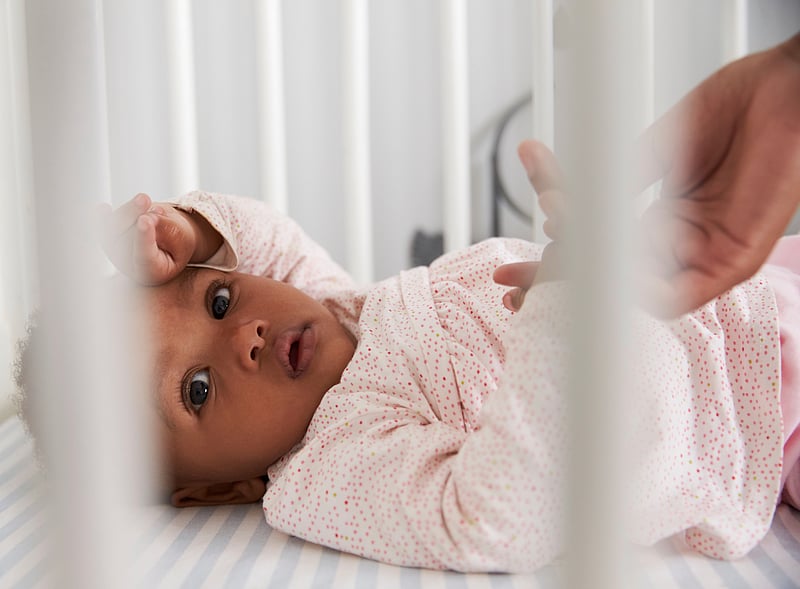Manténgase sano!

- Amy Norton
- Posted March 13, 2023
Pandemic May Have Caused U.S. Spike in SIDS Deaths in Black Families
During the first year of the pandemic, the United States saw a spike in the number of Black infants who died suddenly -- worsening a longstanding disparity, a new government study finds.
The increase was seen in what's called sudden unexpected infant death, or SUID. It's a term used when a baby younger than 1 year dies from no immediately obvious cause, often during sleep. SUID includes cases of the much better known SIDS (sudden infant death syndrome), as well as incidents where babies accidentally suffocate during sleep, and deaths where no cause can be determined.
Overall, the United States has seen a drop in those sudden infant deaths since the 1990s, according to the U.S. Centers for Disease Control and Prevention.
That success is attributed largely to public health campaigns encouraging safer infant sleep practices. For years, parents have been advised to put their baby to sleep on the back, not the tummy; keep cribs free of blankets and other loose bedding; and avoid bed-sharing with their baby.
Despite the declining overall rate in SUID, however, racial disparities have persisted.
Now, in this latest study, the CDC found that sudden deaths among Black infants rose between 2019 and 2020, but held steady or declined among babies of other races and ethnicities.
The result was a widening in the disparity that already existed pre-pandemic, said Sharyn Parks, one of the CDC researchers who worked on the study.
In 2020, Black families had over double the risk of losing an infant to SUID, versus the average for the country as a whole. For every 100,000 Black infants born that year, 214 died suddenly -- up from about 190 per 100,000 in 2019, the study found.
Meanwhile, SUID rates were lower, and did not spike in 2020, among white, Hispanic or Asian-American infants.
There is no single reason that Black infants are dying at a higher rate, experts said.
"It's obviously a complex issue," said Dr. Rebecca Carlin, a pediatrician at Columbia University Irving Medical Center, in New York City. She is co-author of an editorial published with the CDC study in the journal Pediatrics.
Carlin said that while safe sleeping practices are critical to preventing SUID, there are also social and economic disparities at work.
For one, Black women in the United States are less likely to have access to early prenatal care, which, among other benefits, can reduce the risk of preterm birth. Preterm birth is a risk factor for SUID, Carlin noted.
Similarly, when Black families cannot get to routine pediatrician visits, they may not learn about safe sleep practices.
Meanwhile, Carlin said, many Black moms lack paid maternity leave from their jobs. That means they have to rely on other caregivers, who may not always know how to put infants to sleep safely. Plus, those same moms may find it impossible to breastfeed -- which helps lower the risk of SUID.
The pandemic only worsened the situation, Parks and Carlin said.
"We know the COVID-19 pandemic and mitigation efforts -- such as stay-at-home orders -- disproportionately affected racial and ethnic minority communities," Parks said.
On top of having even more difficulty accessing health care, she said, people of color suffered more job losses, and stress over paying the rent and buying food. Some people lost their homes, and may have moved in with family or friends.
"These factors may have led to more unsafe sleep practices like bed-sharing, thereby increasing the occurrence of SIDS and other sudden unexpected infant deaths," Parks said.
Plus, Carlin said, many Black Americans who did keep their jobs were "essential workers" who had no option to work from home. So mothers had to go to work at a time when child care centers closed, and many scrambled to find a replacement -- perhaps, Carlin noted, family or friends with little infant care experience.
On top of that, she said, those same moms were probably exhausted and emotionally drained: If their babies slept better in bed with them, they may have made that choice.
Parks said the CDC is continuing its routine monitoring of SUID, and it remains to be seen whether rates among Black babies changed as the pandemic wore on.
But even if things improved from 2020, Carlin pointed out, the disparity has always been there.
What's needed, she said, are "systems where new mothers are supported and can focus on parenting instead of paying the rent."
More information
The American Academy of Pediatrics has more on safe infant sleeping.
SOURCES: Sharyn E. Parks, PhD, MPH, senior epidemiologist, Perinatal and Infant Health Team, U.S. Centers for Disease Control and Prevention, Atlanta; Rebecca F. Carlin, MD, assistant professor, pediatrics, Columbia University Irving Medical Center, New York City; Pediatrics, March 13, 2023, online







